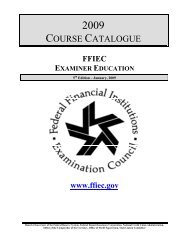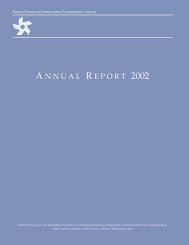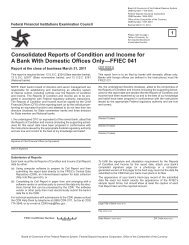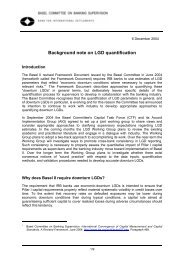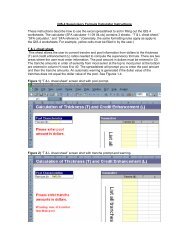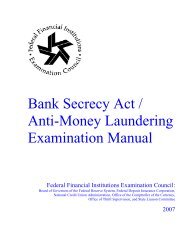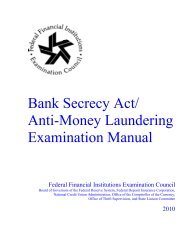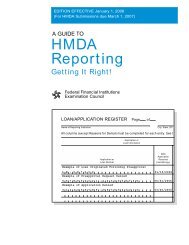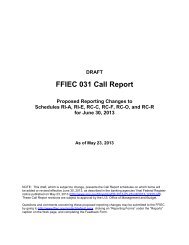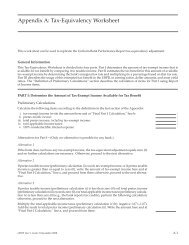FFIEC Annual Report 1999
FFIEC Annual Report 1999
FFIEC Annual Report 1999
Create successful ePaper yourself
Turn your PDF publications into a flip-book with our unique Google optimized e-Paper software.
Regular meetings of the Council are<br />
held quarterly. Special meetings<br />
may be scheduled whenever matters<br />
of high priority must be considered<br />
without delay.<br />
The Council’s activities are funded<br />
in several ways. Most of the<br />
Council’s funds are derived from<br />
semiannual assessments on its five<br />
constituent agencies. The Council<br />
also receives reimbursement for<br />
the services it provides to support<br />
preparation of the quarterly Uniform<br />
Bank Performance <strong>Report</strong><br />
(UBPR). It receives tuition fees from<br />
nonagency attendees to cover some<br />
of the costs associated with its<br />
examiner-education program.<br />
The Federal Reserve Board provides<br />
budget and accounting services to<br />
the Council, and the Federal<br />
Reserve’s Associate Director for<br />
Management serves as the Council’s<br />
Controller. The Council is supported<br />
by a small full-time administrative<br />
staff in its operations office, and its<br />
examiner-education program is administered<br />
by Council staff at its<br />
Examiner Training Facility in<br />
Arlington, Virginia. Each Council<br />
staff member is detailed from one<br />
of the five agencies represented on<br />
the Council but is considered an<br />
employee of the Council. All Council<br />
employees are in the Office of<br />
the Executive Secretary. The major<br />
responsibilities of the Office of<br />
the Executive Secretary are the<br />
following:<br />
ADMINISTRATION OF THE COUNCIL<br />
scheduling Council meetings,<br />
preparing agendas for Council<br />
meetings, preparing minutes<br />
of Council meetings, and reviewing<br />
all material for Council<br />
consideration<br />
monitoring the work of all interagency<br />
staff groups involved in<br />
the Council’s activities and helping<br />
staff groups set priorities and<br />
define key issues<br />
undertaking special projects<br />
and studies as requested by the<br />
Council<br />
working closely with members of<br />
the State Liaison Committee to<br />
ensure adequate communication<br />
among the members, Council,<br />
and interagency staff groups<br />
coordinating public information<br />
activities, including preparation<br />
and distribution of Council press<br />
releases<br />
maintaining liaison with the Congress<br />
and with federal departments<br />
and agencies<br />
preparing the Council’s annual<br />
report to the Congress<br />
coordinating the production and<br />
distribution of the quarterly<br />
UBPR and related data<br />
coordinating the collection, production,<br />
and distribution of<br />
Home Mortgage Disclosure Act<br />
data<br />
managing the Council’s<br />
examiner-education program.<br />
Six interagency staff task forces and<br />
the Legal Advisory Group (LAG)<br />
provide most of the staff support<br />
in the substantive areas of concern<br />
to the Council. The task forces and<br />
the LAG are responsible for the<br />
research and other investigative<br />
work that agency staff members<br />
perform on behalf of the Council<br />
and for reports and policy recommendations<br />
prepared for Council<br />
consideration. In addition, the<br />
Council has established the Agency<br />
Liaison Group, an interagency<br />
group of senior officials responsible<br />
for coordinating the efforts of their<br />
respective agencies’ staff members<br />
in support of the Council. The<br />
Executive Secretary of the Council<br />
is an ex officio member of the six<br />
interagency staff task forces as<br />
well as the Agency Liaison Group.<br />
The staff time and other resources<br />
expended on Council-related<br />
projects in <strong>1999</strong> were provided<br />
by the five agencies without reimbursement<br />
and are not reflected in<br />
the Council budget. Without those<br />
contributions by the agencies and<br />
individual staff members, significant<br />
progress on Council projects<br />
during <strong>1999</strong> would have been<br />
impossible.<br />
9




